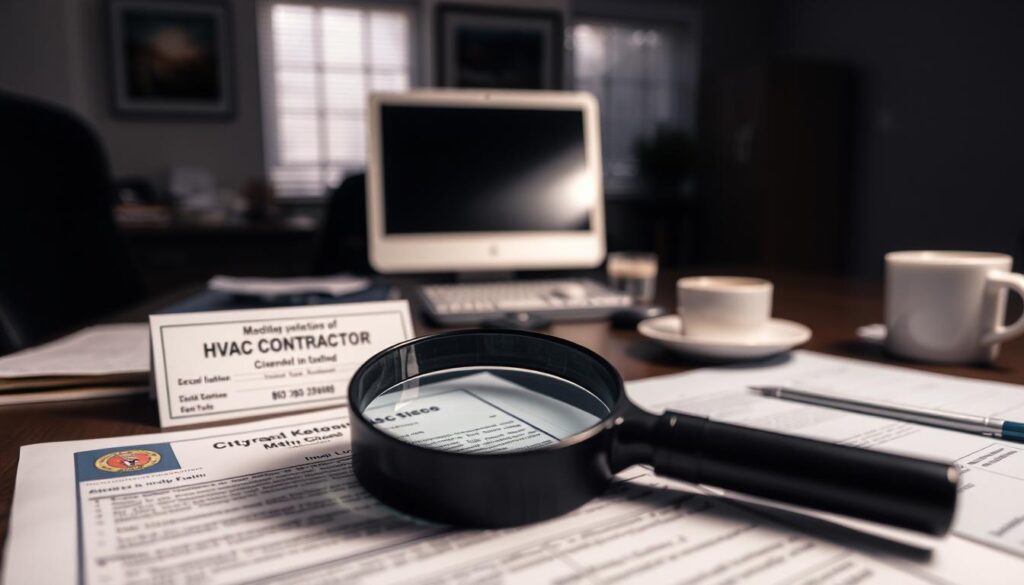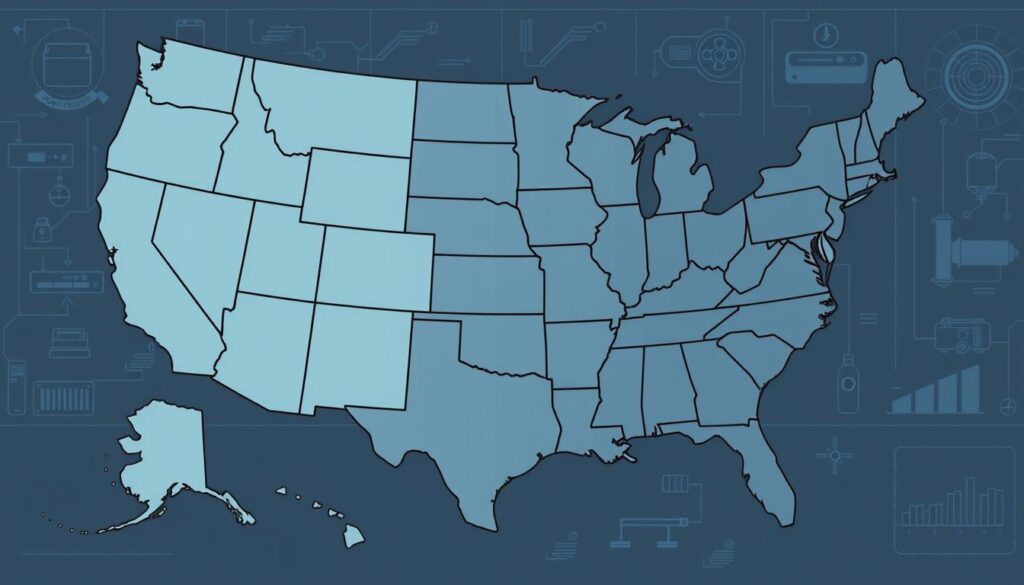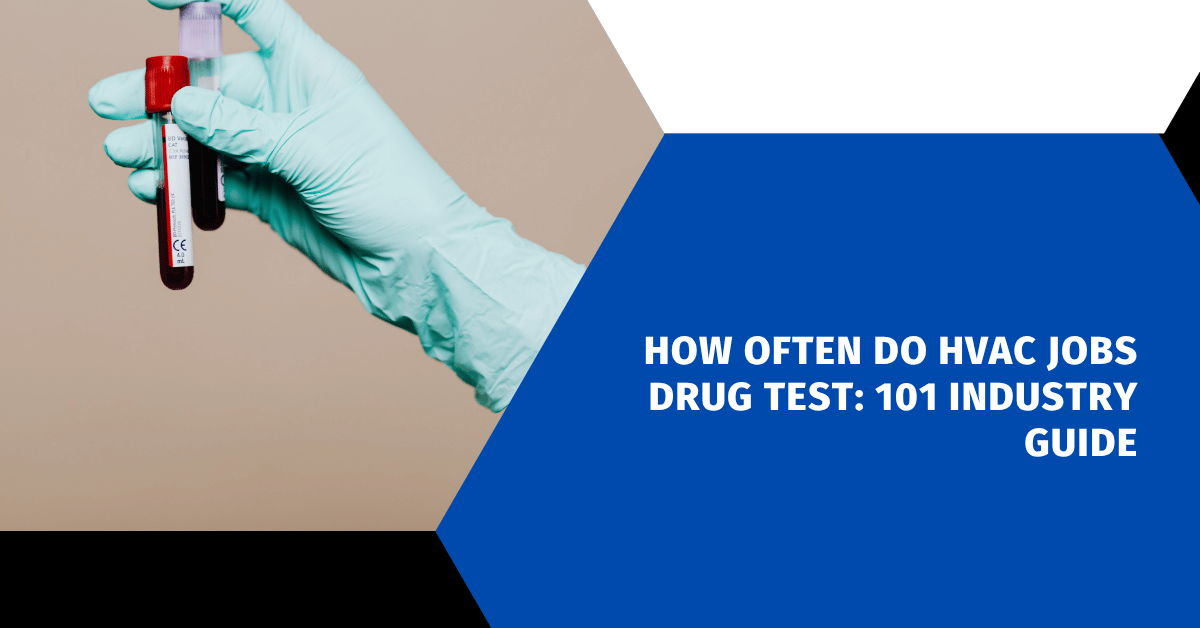Affiliate Disclosure
HVAC Guide Guys is a participant in the Amazon Services LLC Associates Program, an affiliate advertising program designed to provide a means for sites to earn advertising fees by advertising and linking to Amazon.
How Often Do HVAC Jobs Drug Test? Are you curious about how often HVAC jobs drug test? What do these policies mean for your career? The skilled trades industry values workplace safety a lot. Drug testing is now a key part of hiring and keeping a reliable team.

The HVAC industry has its own challenges in finding and keeping skilled workers. Drug testing is a big part of making sure the workplace is safe. It helps lower accidents and keeps service quality high. Knowing how often HVAC jobs drug test can help you find better job chances.
HVAC employers know a drug-free workplace is key for safety. These tests help make a safe and professional place to work. They also help deal with the shortage of skilled workers in the trades.
Key Takeaways
- Drug testing is standard practice in most HVAC employment scenarios
- Safety concerns drive thorough screening procedures
- Pre-employment and random testing are common industry practices
- State laws significantly influence drug testing requirements
- Understanding testing policies can improve job preparation
Table of Contents
Understanding Drug Testing in the HVAC Industry
Drug screening for HVAC technicians is key to workplace safety and professional standards. As the industry focuses on safety and reliability, it’s vital to grasp drug testing details. This is important for employers and job seekers alike.
The HVAC industry has strict drug testing rules. These rules ensure safety, equipment quality, and professional work. Pre-employment drug tests are a major part of hiring for HVAC jobs.
Types of Drug Tests Utilized
Many drug testing methods are used in the HVAC field:
- Urine screening (most common method)
- Blood tests for precise substance detection
- Hair follicle tests for extended substance history
- Saliva-based rapid screening
Common Testing Scenarios
Drug tests for HVAC technicians happen in different situations:
| Testing Scenario | Purpose |
|---|---|
| Pre-Employment | Initial candidate qualification |
| Random Testing | Ongoing workplace safety monitoring |
| Post-Incident | Investigating possible substance use |
| Reasonable Suspicion | Addressing observed behavioral concerns |
Legal Requirements and Regulations
HVAC employers face complex drug testing laws. Federal and state rules guide fair and consistent drug screening. Some places have specific rules on when and how tests can be done.
Knowing these rules helps protect both employers and employees during drug tests.
How Often Do HVAC Jobs Drug Test
Drug testing in the HVAC industry changes a lot. It depends on many factors. Most companies test for drugs to keep the workplace safe and uphold professional standards.
Employers test for drugs in different situations:
- Pre-employment screening
- Random drug testing in the HVAC industry
- Post-incident evaluations
- Reasonable suspicion assessments
The timing of drug tests varies based on several important things:
- Company size and policy – Bigger companies often test more
- Safety-sensitive positions – Workers in risky jobs get tested more often
- State regulations – Local laws play a big role in testing rules
Most HVAC companies do drug tests before hiring. Then, they might test randomly every few months. Some companies test their key workers even more often.
Jobs like commercial installation or industrial maintenance get tested more. This is because their work is very risky.
Safety is the main reason for drug testing in HVAC. It keeps workers and clients safe.
Knowing about these testing patterns helps you stay ready and professional in your HVAC job.
Explore Our HVAC Shop
Looking for top-rated HVAC tools, parts, and accessories? Visit our shop and find the perfect solution for your needs.
Visit the ShopPre-Employment Drug Testing Policies
HVAC pre-employment drug tests are key to a safe and professional work place. Contractors aim to keep their work places drug-free. They do this through thorough screening processes that protect everyone involved.
When you apply for an HVAC job, you’ll go through several drug screening stages. These stages are designed to ensure safety and uphold professional standards in the workplace.
Initial Screening Process
The first drug screening happens early in your job application. HVAC employers follow a structured drug testing approach:
- Submit application and resume
- Complete initial interview
- Receive preliminary job screening
- Undergo mandatory drug test
Conditional Job Offer Testing
Many HVAC contractors offer a conditional job offer after a drug test. This lets employers:
- Evaluate candidate’s qualifications
- Do thorough background checks
- Check if the candidate is drug-free
- Ensure workplace safety
Background Check Requirements
Background checks add to HVAC pre-employment drug tests. They give a full view of a candidate’s professional past. These checks usually include:
- Criminal record verification
- Previous employment confirmation
- Professional license validation
- Drug screening results
By having strict drug testing policies, HVAC contractors show they care about a safe, professional, and drug-free work environment.
Random Drug Testing in Safety-Sensitive Positions
Random drug testing is key in the HVAC industry for keeping workplaces safe. It’s a way for employers to ensure safety by testing for drugs. This protects workers and clients from harm.
HVAC technicians need to be sharp and focused. If they’re not, accidents can happen. Testing for drugs helps prevent these issues by discouraging substance use.
- Ensures workplace safety for technicians and clients
- Reduces accidents caused by poor performance
- Creates a professional work environment
Most HVAC companies use advanced testing methods. These methods are fair and random. They use computers to pick who gets tested, avoiding bias.
Important things to think about when testing for drugs include:
- Clear testing rules
- Keeping employee info private
- Helping employees who need it
Employers must find a balance between safety and privacy when testing for drugs. The aim is to make a safe and productive work environment for everyone.
Explore Our HVAC Shop
Looking for top-rated HVAC tools, parts, and accessories? Visit our shop and find the perfect solution for your needs.
Visit the ShopPost-Incident and Reasonable Suspicion Testing
Drug testing in the HVAC industry is not just routine. It also includes post-incident and reasonable suspicion tests. These are key to keeping workplaces safe and tackling substance abuse among HVAC workers.
After incidents or when supervisors notice odd behaviors, drug testing rules for HVAC companies kick in. These rules guide how to check for substance use problems.
Defining Reasonable Grounds
Reasonable grounds for drug testing include:
- Observable performance drop
- Major safety breaches
- Visible signs of being under the influence
- Recorded workplace accidents
Investigation Procedures
If substance abuse is suspected, HVAC employers must follow a set process:
- Record specific behavioral observations
- Talk to human resources
- Have a private interview
- Choose the right testing method
“Safety is our top concern. Substance abuse testing keeps both workers and clients safe.”
Documentation Requirements
Keeping accurate records is vital for legal reasons and fairness. Employers need to document:
- Specific behavioral observations
- Statements from witnesses
- Test outcomes
- Actions taken next
Through strict post-incident and reasonable suspicion testing, HVAC companies can make workplaces safer. They also help employees dealing with substance abuse issues.
Impact of State Laws on HVAC Drug Testing

Drug testing rules for HVAC companies vary by state. Each state has its own way of handling drug testing policies. This makes it hard for HVAC employers to follow the law and keep their workplaces safe.
State laws on marijuana have changed how HVAC companies test for drugs. Even in states where marijuana is legal, HVAC businesses can keep their workplaces drug-free. This means HVAC companies face different rules in different places.
- States with recreational marijuana legalization
- States with medical marijuana exceptions
- States maintaining strict prohibition
Your HVAC company needs to check local laws to make good drug testing plans. Each state has its own rules that affect:
- How you test new employees
- How often you test for drugs
- What privacy rights employees have
- The legal risks of drug testing
| State Category | Drug Testing Approach | Employee Protections |
|---|---|---|
| Strict Prohibition States | Comprehensive Testing | Limited Employee Rights |
| Medical Marijuana States | Conditional Testing | Some Medical Exceptions |
| Recreational Use States | Regulated Testing | Enhanced Employee Protections |
Professional HVAC companies must stay informed about evolving state drug testing regulations to maintain legal compliance and workplace safety.
Drug Testing as Part of Rehabilitation Programs
Substance abuse can really hurt how well HVAC workers do their jobs and keep everyone safe. Rehab programs are key in helping employees with drug issues. They also help keep the workplace free from drugs.
When an HVAC contractor finds out an employee is struggling with drugs, they start strong support plans. These plans help the worker get better and keep the workplace safe.
Return-to-Work Agreements
A return-to-work agreement helps HVAC workers get back on the job after treatment. It includes:
- Mandatory ongoing drug testing
- Compliance with treatment recommendations
- Regular performance evaluations
- Potential temporary role modifications
Monitoring and Support Systems
Good drug-free workplace policies have strong monitoring systems. These systems check on how well an employee is doing and offer help when needed.
- Regular drug screenings to ensure continued sobriety
- Access to counseling services
- Confidential employee assistance programs
- Potential temporary job reassignments
The aim of these programs is to help, not punish. HVAC employers can support workers in overcoming drug issues. This way, they keep the workplace safe and productive.
Explore Our HVAC Shop
Looking for top-rated HVAC tools, parts, and accessories? Visit our shop and find the perfect solution for your needs.
Visit the ShopConsequences of Failed Drug Tests

Failed drug tests among HVAC pros can lead to big problems. They create a strict no-tolerance policy. This policy can hurt an employee’s career a lot.
When a drug test fails, employers might take several steps:
- They might suspend you right away
- They could fire you
- They might make you go to substance abuse counseling
- They could ask you to join a rehab program
Failed drug tests can also block your way to future jobs in HVAC. Companies often share lists of people who failed drug tests. This makes it hard to get back into the industry.
Here are some things you can do after a failed drug test:
- You can try to appeal the test results
- You can join employee help programs
- You can finish a rehab program
- You can show you’re serious about safety at work
Rehab and second chances vary by company and state laws. Some employers have plans to help you get back to work after you deal with substance abuse.
Your professional reputation and safety are key in HVAC. Knowing the risks of drug use can help you avoid serious mistakes.
Multi-Stage Hiring Process and Drug Screening
Understanding the HVAC job market means knowing the hiring process employers use. Drug tests for HVAC technicians are key to keeping workplaces safe and professional.
When you apply for an HVAC job, you’ll go through a detailed process. It checks if you’re right for the job. The steps include:
- Initial application screening
- Phone or preliminary interview
- In-person interview
- Skills assessment
- Background check
- HVAC pre-employment drug tests
- Final job offer
Interview Phases
Interviews are not just about your skills. Employers want to see if you’re reliable, professional, and safety-focused. Drug tests usually happen after interviews but before the job offer.
Candidate Assessment Methods
Employers use many ways to choose the right candidate. Drug tests for HVAC technicians are part of this. They also look at:
- Technical skills testing
- Practical hands-on assessments
- Reference verification
- Comprehensive background checks
By following a strict hiring process, HVAC companies keep their teams and clients safe. They also make sure they hire the best people.
Explore Our HVAC Shop
Looking for top-rated HVAC tools, parts, and accessories? Visit our shop and find the perfect solution for your needs.
Visit the ShopRights and Responsibilities of HVAC Employers
Drug testing in HVAC companies is a tricky issue. It’s about keeping the workplace safe and respecting employee rights. HVAC employers must know their legal duties in setting up drug testing rules.
Here are some key duties for HVAC employers:
- Creating clear and consistent drug testing policies for HVAC
- Following federal and state drug testing laws
- Keeping employee privacy during tests
- Ensuring tests are fair for everyone
Legal rules are very important when making drug testing plans. The Occupational Safety and Health Administration (OSHA) offers guidelines. These help employers make fair and clear testing rules. Your company needs to make policies that:
- Clearly tell employees what to expect
- Apply the same rules to everyone
- Respect each person’s privacy
- Offer chances to get help if needed
Employers should talk to lawyers to make sure their drug testing rules are legal. This way, they avoid legal trouble and keep the workplace safe.
Workplace safety and employee rights are not mutually exclusive goals.
Knowing these complex duties helps protect both the company and its workers. It makes the workplace open and supportive for everyone.
Conclusion
Drug testing is key to keeping the HVAC industry safe and professional. You’ve learned that how often jobs drug test varies. This depends on many things like laws, company rules, and regulations.
HVAC contractor drug-free workplace standards are getting better. They focus on fair and complete testing. Employers need to find a balance between keeping the workplace safe and respecting employees’ privacy.
It’s important for HVAC workers and bosses to know about drug testing rules. Whether you’re looking for a job or running a business, knowing these rules helps you make smart choices. Drug testing should be about safety, respect, and professionalism in the workplace.
The HVAC industry is always changing, and knowing about drug testing is key to success. By understanding these rules, you help make the workplace safer and more productive for everyone.

